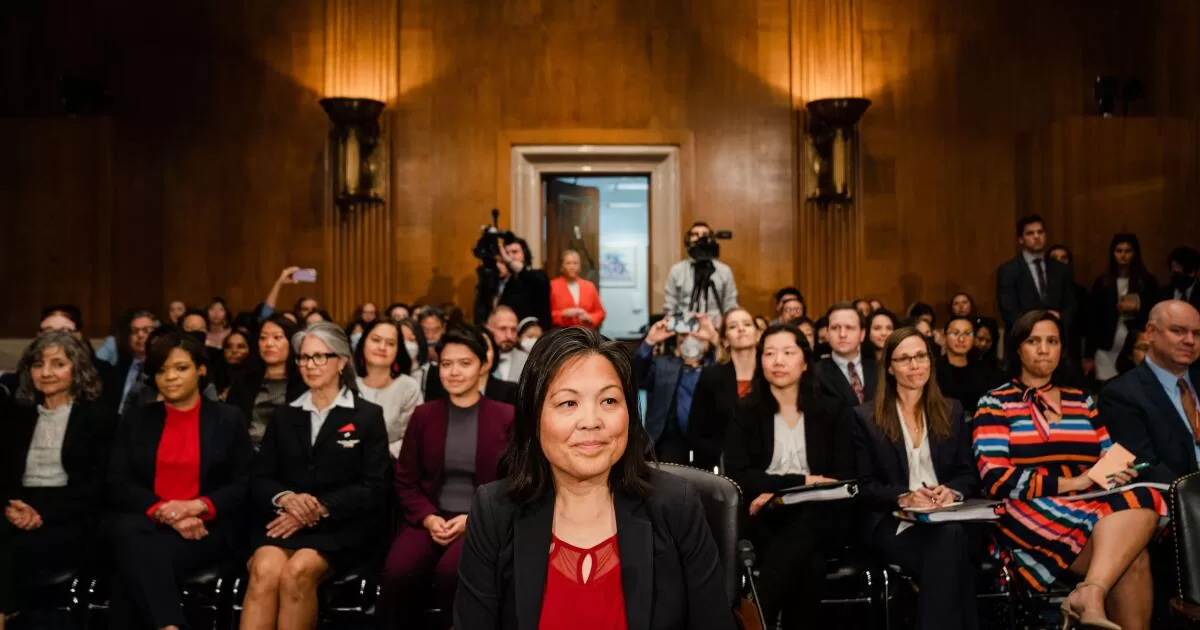Su, who was previously California’s labor chief, was nominated by President Biden a year ago and has served as acting secretary since March. Three undecided Democrats plus Sen. Kyrsten Sinema (I-Ariz.) held up a full Senate confirmation, which needed near-unanimous support from Senate Democrats to pass.
Without a final floor vote, Su’s nomination was returned to the White House at the end of last year.
Committee members voted Tuesday along party lines, with 11 Democrats supporting advancement of Su’s nomination and 10 Republicans voting against it.
The markup was visibly tense as Sen. Bernie Sanders (I-Vermont) rejected committee member Sen. Bill Cassidy’s (R-La.) request to make a statement for the record.
Cassidy, the ranking Republican, interrupted anyway, telling reporters in the room: “This person has been acting secretary for a year, even though she would have been rejected on the floor and we’re not having another hearing.”
Republicans have described Su’s policies as pro-union and anti-business. They took particular issue with Assembly Bill 5, the California law that requires companies to classify most workers as employees instead of as independent contractors. Su didn’t draft the bill but provided some technical assistance at the end of the process.
Democrats said she’s highly qualified for the job and has made groundbreaking advances in workers’ rights protections. They say Su, a progressive Californian, has been caught up in the political divisiveness of Washington.
The Health, Education, Labor and Pensions Committee initially voted to advance Su’s nomination to Labor secretary in April.
Sanders said he strongly supports Su’s renomination.
“She has been an excellent Deputy Secretary of Labor, an excellent Acting Secretary of Labor, and I believe that she will make an excellent Secretary of Labor,” Sanders wrote in a statement. “Her strong pro-worker track record and tireless dedication to working families across this country shows beyond a shadow of a doubt that she is the right person for the job. I urge my colleagues to support her nomination.”
Earlier this month, Cassidy urged Sanders to hold a new nomination hearing before scheduling another vote.
Cassidy took issue with what he called her “troubling record” as acting Labor secretary, including the department’s final rule that establishes guidelines for classifying workers as employees or independent contractors; a proposed rule to expand overtime pay eligibility; and a proposed rule allowing union leaders to participate in workplace inspections.
“It has been almost a year since Mrs. Su’s nomination hearing. It’s important that we examine the many issues that have arisen since then and get an explanation of those serious concerns,” Cassidy said during a Senate floor speech Monday night, criticizing Sanders’ decision to not hold another public hearing. “No one is above accountability, especially an unconfirmed yet acting Cabinet-level nominee with massive influence over our nation’s economy.”
A backlog of cases at the Labor Department last year caused frustrating months-long delays for employers and immigrants seeking to obtain H-2B visas for seasonal nonagricultural jobs. Cassidy blamed Su for mismanaging the agency.
He also pointed to New York Times reporting that federal officials repeatedly ignored warnings that migrant children were increasingly working in slaughterhouses, factories and on roofs, in violation of child labor laws.
The Labor Department responded that its inspectors had found thousands of violations, and Su said the administration was “leaving no stone unturned to root out exploitative child labor.”
The Labor Department’s independent watchdog launched an audit in August of how officials responded to the surge in child labor violations.
Business interest groups including the National Federation of Independent Business issued statements ahead of Tuesday’s vote opposing her nomination, saying her policy changes have created burdensome rules for business owners.
Meanwhile, labor unions, immigrant advocates and worker groups praised her for modernizing unemployment insurance and improving access to good-paying jobs through workforce development programs.
After Biden took office, the Senate voted along party lines to confirm Su as deputy Labor secretary. Before that, she spent seven years leading California’s Division of Labor Standards Enforcement.
In 2021, the California Employment Development Department reported $20 billion in fraudulent unemployment claims. Su’s supporters said she inherited many issues when she took over the department and noted that employment fraud rose across the country during the COVID-19 pandemic.
With Su’s nomination out of committee, her supporters could restart efforts to convince Democratic holdouts to bring her confirmation to the Senate floor for a full vote.
